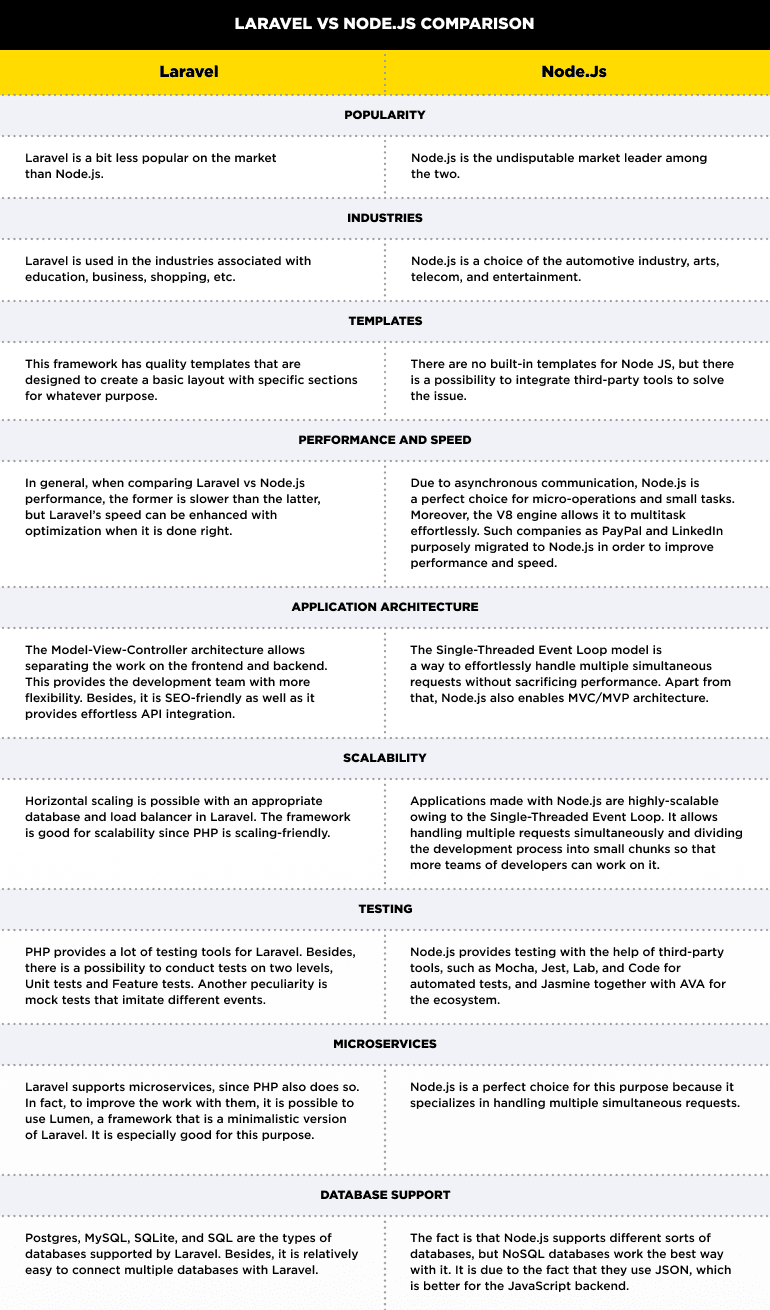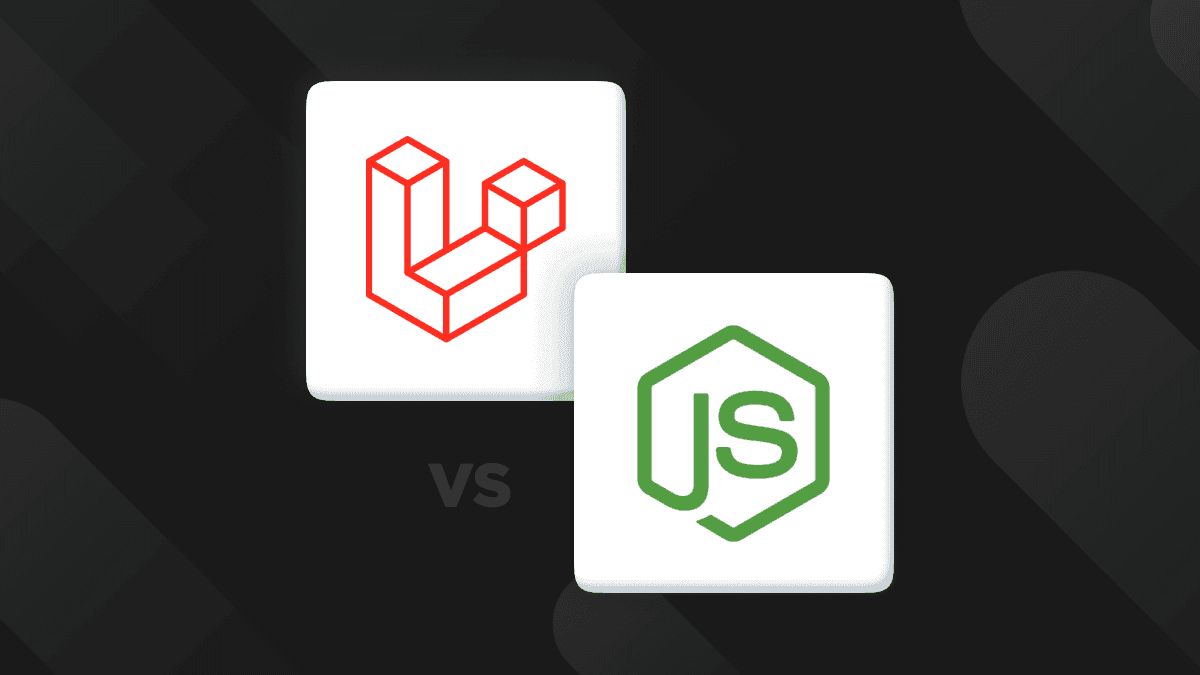One of the crucial choices when it comes to the development of web applications is the choice of backend framework. Web frameworks are essential packages that facilitate the development process. They contain a lot of built-in features that are a web development standard. In fact, frameworks strongly reduce the development time, and due to this, the phase of production takes place earlier with them. Therefore, the choice of a framework directly affects the success of your project, and therefore, it has to be approached with special caution.
In fact, you can hardly fail if you choose a PHP-based framework because they hold 79% of the market as far as backend programming is concerned. However, Node.js looks more credible due to the contributions of such tech companies as Amazon, Facebook, and Google. Therefore, in this article, we will analyze the pros and cons of Laravel vs Node.js and then compare their capabilities to help you choose the right framework for your specific project.
What is Laravel?
Laravel is an open-source PHP framework that conducts routing and HTML authentication on the server-side. Taylor Otwell wrote Laravel on PHP, for which he used some of Symfony components.
Because Laravel is based on the server-side, with it, you can develop apps that have pre-defined architecture, apps with customizable logic, templates, and full-stack applications, and also you will be able to manage and maintain SaaS projects.
Some Features of Laravel
Now that we overviewed the basic information about Laravel, let us dive into specifics:
Template Engine
This framework is famous for its lightweight templates that are built-in. One can create astonishing layouts with some interactive content. Besides, it is easy to integrate CSS and JavaScript code into stable structures. In such a way, it is possible to create complex layouts from simple segments.
MVC Architecture Support
Model-View-Controler (MVC) architecture allows you to separate the business logic from presentation layers. This pattern improves the performance of an application, making it more safe and more usable.
Security
Web apps built with Laravel are secure due to the fact that their passwords are hashed and salted, and therefore, they cannot be saved in the database as text. Moreover, it is invincible to SQL attacks owing to SQL statements, which prevent the injection.
Database Migration System
The migration system of Laravel broadens the structure of a web app’s database. It does so without recreations every time the code changes. Because it works in such a way, it is almost impossible to lose data during the process. Therefore, with Laravel, you can change the structure of a database as well as use PHP rather than SQL.
Use Cases of Laravel:
SaaS web apps
Online streaming web apps
Educational technology web apps
Stock trading web applications
CMS systems that support different languages
Performance monitoring web apps
What is Node.js?
Node.js is a backend runtime environment that is based on JavaScript. Therefore, it would be a mistake to call Node a framework, like Laravel. Node.js is an open-source tool. It is powered by the V8 engine that translates JavaScript into machine code. Another of its main features is async programming, which provides the absence of lags. The technical features of Node.js make applications based on Node.js lightweight and efficient. This (together with high performance and scalability) explains its immense popularity.
Node.js also allows you to use the frameworks, which are based on it, in order to increase the capabilities of the backend part. Those frameworks are Express, Socket.io, and Meteor.js. The real-time or push-based architecture is what will help to build a quality SPA, web app, or backend API.
Node.js is a JavaScript runtime outside the browser. It allows you to develop server-side code for dynamic web pages, web applications, and command-line programs. Therefore, Node.js involves using one programming language to develop web applications instead of using different languages ​​to work on the front-end and back-end.
Node.js is not a separate programming language, but a platform for using server-side JavaScript. In plain English, the same JavaScript is used for both the frontend and the backend. The only difference is in the set of APIs that frontend and backend use. All in all, Node.js is a technology for using JS on the backend.
The choice of server-side JavaScript for the backend provides a number of advantages to the project:
increased development efficiency due to the use of one language for the front and back end and the possibility of code reuse;
the ability to use NPM — the largest package manager;
it is easier to find executors than other stacks, since JavaScript is one of the most popular programming languages.
Node.js is well suited for developing RTAs, which are web applications that respond to user input in real-time. For instance, you can create an online editor like Google Docs, or other piece of software that allows multiple users to work on one document at the same time.
Some Features of Node.js:
Asynchronous
All the library APIs of Node.js are event-driven. Simply put, the server on Node.js does not wait for a response from API. Instead, after calling API, it sets its focus to the next one. The Events notification function is what triggers the server to receive an answer from the API.
Single-Threaded
Node.js processing model is a single-threaded event loop. Instead of calling to one thread per request, this model serves all the requests. Such an approach makes Node.js servers more scalable.
Object-Oriented
At first, Node.js was widely criticized because of JavaScript, which was the reason for a lot of difficult-to-understand and hard-to-maintain source code. However, there are several advantages concerning JS, one of which is Classes that make the code similar to C#, Java, and SWIFT when the syntax is concerned.
Cross-Platform
Node.js allows cross-platform development because this environment transfers system-specific functions into APIs that can be accessed by the code.
Use Cases of Node.js:
Online streaming web apps
Real-time software (chats, communication programs, and video games)
Complex SPAs
Microservices
Web apps for IoT
Servers
Backend APIs
Automation and Scripts
Laravel vs Node.js Comparison


Get a free development breakdown
contact usConclusions
To sum up, by comparing Laravel vs Node.js, you can notice that they are both different tools for different purposes. Therefore, the comparison of Node vs Laravel makes sense only when you know the basics but cannot predict how their specifics will affect your project.
The most important things you should consider when choosing Laravel or Node.js for your project are their fundamental differences. It may be obvious that Laravel is all about PHP , and Node.js works with JavaScript, but there is one other difference that will influence the work on your project. It is a fact that Laravel is a framework, but Node.js is a platform. The consequences are that when you set up Laravel on your server, then the website starts working at an instance with a single page. That’s it. However, in the case of Node.js, you will have to configure everything.
Taking into consideration this difference and all mentioned above, you can choose one of them for your project more easily, but in case you still have questions or difficulties, we will gladly help you decide what to choose for your future project with us.
By the way, in our work, we usually use both Laravel and Node.js to succeed in the implementation of our clients’ ideas. You can check out what we did with Laravel and Node.js for one of the Ukrainian industry leaders or the American startup. In our opinion, Laravel, Node.js, and OTAKOYI are a trio that works for inevitable success. Do you want to join?




